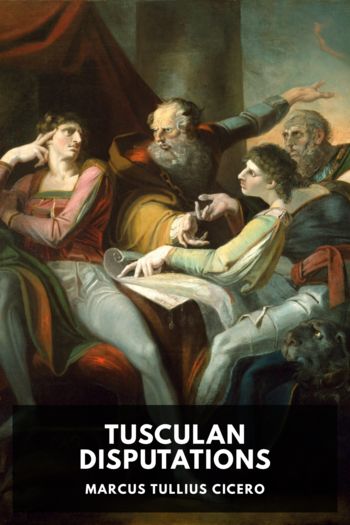Tusculan Disputations, Cicero [good book recommendations TXT] 📗

- Author: Cicero
Book online «Tusculan Disputations, Cicero [good book recommendations TXT] 📗». Author Cicero
That, indeed, is no argument at all, for as all the fields which are cultivated are not fruitful (and this sentiment of Accius is false, and asserted without any foundation,
The ground you sow on is of small avail;
To yield a crop good seed can never fail)
it is not every mind which has been properly cultivated that produces fruit. And, to go on with the comparison, as a field, although it may be naturally fruitful, cannot produce a crop without dressing, so neither can the mind without education; such is the weakness of either without the other. Whereas philosophy is the culture of the mind: this it is which plucks up vices by the roots, prepares the mind for the receiving of seeds, commits them to it, or, as I may say, sows them, in the hope that, when come to maturity, they may produce a plentiful harvest. Let us proceed, then, as we began. Say, if you please, what shall be the subject of our disputation.
A. I look on pain to be the greatest of all evils. M. What, even greater than infamy? A. I dare not indeed assert that, and I blush to think I am so soon driven from my ground. M. You would have had greater reason for blushing had you persevered in it, for what is so unbecoming—what can appear worse to you—than disgrace, wickedness, immorality? To avoid which, what pain is there which we ought not (I will not say to avoid shirking, but even) of our own accord to encounter, and undergo, and even to court? A. I am entirely of that opinion. But notwithstanding that pain is not the greatest evil, yet surely it is an evil. M. Do you perceive, then, how much of the terror of pain you have given up on a small hint? A. I see that plainly. But I should be glad to give up more of it. M. I will endeavor to make you do so. But it is a great undertaking, and I must have a disposition on your part which is not inclined to offer any obstacles. A. You shall have such. For as I behaved yesterday, so now I will follow reason wherever she leads. M.First, then, I will speak of the weakness of many philosophers, and those, too, of various sects; the head of whom, both in authority and antiquity, was Aristippus, the pupil of Socrates, who hesitated not to say that pain was the greatest of all evils. And after him Epicurus easily gave in to this effeminate and enervated doctrine. After him Hieronymus the Rhodian said that to be without pain was the chief good, so great an evil did pain appear to him to be. The rest, with the exceptions of Zeno, Aristo, Pyrrho, were pretty much of the same opinion that you were of just now—that it was indeed an evil, but that there were many worse. When, then, nature herself, and a certain generous feeling of virtue, at once prevents you from persisting in the assertion that pain is the chief evil, and when you were driven from such an opinion when disgrace was contrasted with pain, shall philosophy, the preceptress of life, cling to this idea for so many ages? What duty of life, what praise, what reputation, would be of such consequence that a man should be desirous of gaining it at the expense of submitting to bodily pain, when he has persuaded himself that pain is the greatest evil? On the other side, what disgrace, what ignominy, would he not submit to that he might avoid





Comments (0)